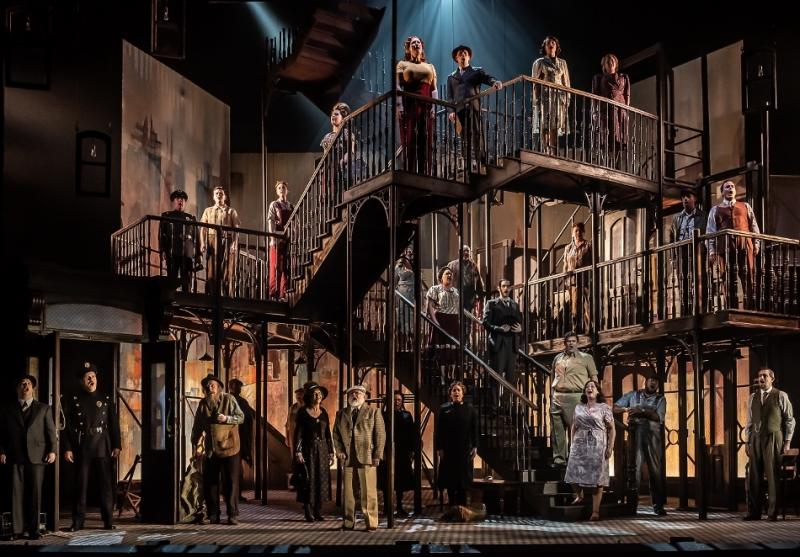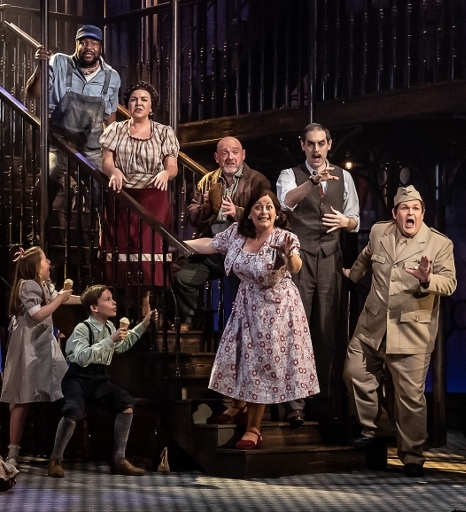Street Scene, Opera North review - a true ensemble achievement | reviews, news & interviews
Street Scene, Opera North review - a true ensemble achievement
Street Scene, Opera North review - a true ensemble achievement
Youth to the fore in Kurt Weill’s brilliant ‘Broadway opera’

Kurt Weill’s “Broadway opera” – his own preferred description – is an extraordinary and brilliant piece of work.
Written in 1947, it pictures life in a New York tenement – and on the street outside – on two sweltering summer days and nights. The climax comes when a jealous husband murders his wife. As tragedy overtakes the affectionate nationality stereotyping (Jewish, Swedish, Italian New Yorkers, and so on), the fun of the earlier numbers gives way to something much deeper. There is a whole series of overlapping, interlocking family and individual stories, with about 10 major characters and dozens of minor ones: Opera North’s cast list has 36 named parts in it, plus a troupe of extra children.
So it’s a huge undertaking for a professional company to put on – which is probably the only reason it doesn’t get done more often. But Opera North is no ordinary professional company. The development of their chorus over recent years into an ensemble of actor-singers, any one of whom can take a role with skill and distinction, has really paid off. In fact only five of the vocal-only principals are not members of the ON Chorus, and those five have no monopoly on major characters.
 The most rewarding thing is that the younger ones are among the best. Gillene Butterfield and Alex Banfield (pictured right), as young in-love couple Rose and Sam, were notable for their acting as much as their singing, and for their diction (something the more mature opera soloists, in this un-mic’d production and with the orchestra making glorious sounds in front of them, did not always remember): her “What Good Would the Moon Be” and his “Lonely House” in Act One were real stand-outs. The same was true of Laura Kelly-McInroy, who has one great solo number, “Wrapped in a Ribbon and Tied in a Bow”, as young Jennie on her college graduation day, and made the most of it – also of Lorna James and Hazel Croft, as two nursemaids from the wealthier part of town, who enliven the final part of the story with their “Lullaby” scene.
The most rewarding thing is that the younger ones are among the best. Gillene Butterfield and Alex Banfield (pictured right), as young in-love couple Rose and Sam, were notable for their acting as much as their singing, and for their diction (something the more mature opera soloists, in this un-mic’d production and with the orchestra making glorious sounds in front of them, did not always remember): her “What Good Would the Moon Be” and his “Lonely House” in Act One were real stand-outs. The same was true of Laura Kelly-McInroy, who has one great solo number, “Wrapped in a Ribbon and Tied in a Bow”, as young Jennie on her college graduation day, and made the most of it – also of Lorna James and Hazel Croft, as two nursemaids from the wealthier part of town, who enliven the final part of the story with their “Lullaby” scene.
Youth nearly stole the show, too, in that jitterbug number, with guest singer-dancers Michelle Andrews and Rodney Vubya as Mae and Dick. Gary Clarke’s choreography rose to the occasion there, with a routine that would not have disgraced Strictly.
Among other characterisations from the Opera North chorus, Claire Pascoe’s Noo Joisey tones as the busybody Mrs Jones were a delight, and so were Dean Robinson’s Jewish left-wing intellectual Abraham, Amy Freston as his teacher daughter Shirley, Miranda Bevin, Amy J Payne and Victoria Sharp as immigrant wives Greta, Olga and Laura, and Paul Gibson as Steve Sankey the philandering milk money collector.
That’s not to say that the guest principal singers let the side down in what must rank as a true ensemble achievement. Giselle Allen takes the role of Anna, the doomed unfaithful wife who has a real aria-style solo early on (“Somehow I Never Could Believe”). Robert Hayward has found the hurt behind her husband Frank’s hateful attitudes, drink problem and violence and sings his big numbers with impressive power – especially “There’ll be Trouble” in Act Two, which turns the whole tone of the show on a sixpence. Christopher Turner makes a charmingly comic portrait of Lippo the Italian ice cream maker, Quirijn de Lang is creepily repulsive as lustful smoothie Harry, and John Savournin makes a sympathetic Swede as Carl.
 James Holmes, a great Weill specialist as well as Opera North stalwart, holds it all together with enormous skill as conductor: the switches from speech to song to speech-with-music and back again need perfect timing to avoid a feeling of stop-start, and he has this totally mastered.
James Holmes, a great Weill specialist as well as Opera North stalwart, holds it all together with enormous skill as conductor: the switches from speech to song to speech-with-music and back again need perfect timing to avoid a feeling of stop-start, and he has this totally mastered.
Matthew Eberhardt as director brings lots of lovely touches to the staging, which is on a three-storeys-high set of staircases, landings and doors designed by Francis O’Connor, and is as adept at marshalling his many adult protagonists as his young charges – the children’s song and dance, “Catch Me If You Can”, which opens Act Two, is one of the highlights of the night, and the final scene, where all the actors and singers unite as a devastatingly powerful chorus, is unforgettable.
And were the cornets real in the Ice Cream Sextet (the true test of any Street Scene, pictured above)? Only one, as far as I could see, devoured by Claire Pascoe with relish, but then she wasn’t in the Sextet and there were so many kids on stage that if they’d all had real ices things might have got out of hand …
- Further performances in Leeds on 12, 20 and 28 February, and in Newcastle on 3 and 6 March, Salford on 13 March and Nottingham on 17 and 20 March
The future of Arts Journalism
You can stop theartsdesk.com closing!
We urgently need financing to survive. Our fundraising drive has thus far raised £49,000 but we need to reach £100,000 or we will be forced to close. Please contribute here: https://gofund.me/c3f6033d
And if you can forward this information to anyone who might assist, we’d be grateful.

Subscribe to theartsdesk.com
Thank you for continuing to read our work on theartsdesk.com. For unlimited access to every article in its entirety, including our archive of more than 15,000 pieces, we're asking for £5 per month or £40 per year. We feel it's a very good deal, and hope you do too.
To take a subscription now simply click here.
And if you're looking for that extra gift for a friend or family member, why not treat them to a theartsdesk.com gift subscription?
more Opera
 La bohème, Opera North review - still young at 32
Love and separation, ecstasy and heartbreak, in masterfully updated Puccini
La bohème, Opera North review - still young at 32
Love and separation, ecstasy and heartbreak, in masterfully updated Puccini
 Albert Herring, English National Opera review - a great comedy with depths fully realised
Britten’s delight was never made for the Coliseum, but it works on its first outing there
Albert Herring, English National Opera review - a great comedy with depths fully realised
Britten’s delight was never made for the Coliseum, but it works on its first outing there
 Carmen, English National Opera review - not quite dangerous
Hopes for Niamh O’Sullivan only partly fulfilled, though much good singing throughout
Carmen, English National Opera review - not quite dangerous
Hopes for Niamh O’Sullivan only partly fulfilled, though much good singing throughout
 Giustino, Linbury Theatre review - a stylish account of a slight opera
Gods, mortals and monsters do battle in Handel's charming drama
Giustino, Linbury Theatre review - a stylish account of a slight opera
Gods, mortals and monsters do battle in Handel's charming drama
 Susanna, Opera North review - hybrid staging of a Handel oratorio
Dance and signing complement outstanding singing in a story of virtue rewarded
Susanna, Opera North review - hybrid staging of a Handel oratorio
Dance and signing complement outstanding singing in a story of virtue rewarded
 Ariodante, Opéra Garnier, Paris review - a blast of Baroque beauty
A near-perfect night at the opera
Ariodante, Opéra Garnier, Paris review - a blast of Baroque beauty
A near-perfect night at the opera
 Cinderella/La Cenerentola, English National Opera review - the truth behind the tinsel
Appealing performances cut through hyperactive stagecraft
Cinderella/La Cenerentola, English National Opera review - the truth behind the tinsel
Appealing performances cut through hyperactive stagecraft
 Tosca, Royal Opera review - Ailyn Pérez steps in as the most vivid of divas
Jakub Hrůša’s multicoloured Puccini last night found a soprano to match
Tosca, Royal Opera review - Ailyn Pérez steps in as the most vivid of divas
Jakub Hrůša’s multicoloured Puccini last night found a soprano to match
 Tosca, Welsh National Opera review - a great company reduced to brilliance
The old warhorse made special by the basics
Tosca, Welsh National Opera review - a great company reduced to brilliance
The old warhorse made special by the basics
 BBC Proms: The Marriage of Figaro, Glyndebourne Festival review - merriment and menace
Strong Proms transfer for a robust and affecting show
BBC Proms: The Marriage of Figaro, Glyndebourne Festival review - merriment and menace
Strong Proms transfer for a robust and affecting show
 BBC Proms: Suor Angelica, LSO, Pappano review - earthly passion, heavenly grief
A Sister to remember blesses Puccini's convent tragedy
BBC Proms: Suor Angelica, LSO, Pappano review - earthly passion, heavenly grief
A Sister to remember blesses Puccini's convent tragedy
 Orpheus and Eurydice, Opera Queensland/SCO, Edinburgh International Festival 2025 review - dazzling, but distracting
Eye-popping acrobatics don’t always assist in Gluck’s quest for operatic truth
Orpheus and Eurydice, Opera Queensland/SCO, Edinburgh International Festival 2025 review - dazzling, but distracting
Eye-popping acrobatics don’t always assist in Gluck’s quest for operatic truth

Add comment